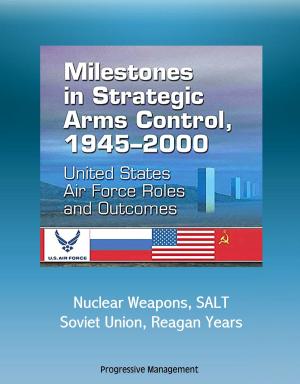National Defense Intelligence College Paper: Attache Extraordinaire: Vernon A. Walters and Brazil - Henry Kissinger, President Eisenhower, Humberto de Alencar Castello Branco, Averell Harriman
Nonfiction, Travel, Caribbean & Latin America, South America| Author: | Progressive Management | ISBN: | 9781310497414 |
| Publisher: | Progressive Management | Publication: | December 13, 2013 |
| Imprint: | Smashwords Edition | Language: | English |
| Author: | Progressive Management |
| ISBN: | 9781310497414 |
| Publisher: | Progressive Management |
| Publication: | December 13, 2013 |
| Imprint: | Smashwords Edition |
| Language: | English |
This unique and informative paper was produced by the National Intelligence University / National Defense Intelligence College.
Vernon Anthony Walters was a military, diplomatic and intelligence officer and emissary for several American presidents. Throughout a busy professional career, he witnessed and participated in various important events of the twentieth century, including the Second World War, the Korean and Vietnam Wars, and the fall of the Berlin Wall, among others. Walters' connections with Brazil were always intense and surrounded by controversy. Having worked as a liaison officer between the U.S. Fifth Army and the Brazilian Expeditionary Force during World War II, Walters became a legend in Brazil due to his participation in the 1964 Revolution.
Vernon Walters was an eternal optimist whose exuberance and enthusiasm lifted the spirits of all with whom he came in contact. Perhaps this is why he identified so closely with Brazil and its sense of destiny. Given Walters' unbounded faith and close ties with Brazil, it is fitting that a Brazilian has written this biography. Frank Marcio de Oliveira has given us a very readable and well-documented account of Walters' evolution from a trusted and extraordinarily talented interpreter in World War II, to prescient diplomat and foreign policy advisor to those at the highest levels of the U.S. Government. Bringing Henry Kissinger into the story, Oliveira offers insight into early parallels between these two iconic statesmen of the late Cold War period, and shows the different paths leading the two to the highest levels of national policy making. Both were insightful thinkers and masters of the art of persuasive communication. In contrast to Kissinger, the stolid academic, Walters rose to the top of his profession without benefit of formal, higher education. The world was his classroom and he used every minute to study and absorb all that it provided. He constantly honed his powers of observation and his prodigious memory. When conversing with him in a crowded room, one would be led to believe that you were the focus of his entire attention. Yet, all the time he was taking in the events around him and listening to nearby conversations. Yes, he was a superb interpreter and intelligence officer, but his rise to the highest levels of public service was possible due to his diligence in processing the lessons of history and working to understand the background and culture of those with whom he came in contact. Henry Kissinger had an impressive academic pedigree, but he could not touch Vernon Walters when it came to communication and understanding our friends and adversaries. Not only did he do this in their language, but also with a great sense of humor.
Chapter 1 * The Missionary and the Giant * The First Connections with Brazil and with Brazilians * The Brazilian Expeditionary Force * From Colonel to General * An Exchange of Messages between Rio and Washington * Chapter 2 * The Missionary's Education * The Preparation * Mark Wayne Clark * Humberto de Alencar Castello Branco * William Averell Harriman * Dwight David Eisenhower * Again with Castello Branco * Chapter 3 * Powerful Products of Their Time * In Search of Precedents: the Difficult Synergy between the Military and Diplomats * Establishing Parallels * Kissinger's and Walters' Early Years * The Beginning of Military Life * Working in Intelligence * Winning Minds and Hearts * Other Points of Comparison * Chapter 4 * A Legend in Brazil * Just a Well-Informed Attache * "You are a Legend in this Country" * A Successor * "A strong Influence on My Life" * An Extraordinary Attache
This unique and informative paper was produced by the National Intelligence University / National Defense Intelligence College.
Vernon Anthony Walters was a military, diplomatic and intelligence officer and emissary for several American presidents. Throughout a busy professional career, he witnessed and participated in various important events of the twentieth century, including the Second World War, the Korean and Vietnam Wars, and the fall of the Berlin Wall, among others. Walters' connections with Brazil were always intense and surrounded by controversy. Having worked as a liaison officer between the U.S. Fifth Army and the Brazilian Expeditionary Force during World War II, Walters became a legend in Brazil due to his participation in the 1964 Revolution.
Vernon Walters was an eternal optimist whose exuberance and enthusiasm lifted the spirits of all with whom he came in contact. Perhaps this is why he identified so closely with Brazil and its sense of destiny. Given Walters' unbounded faith and close ties with Brazil, it is fitting that a Brazilian has written this biography. Frank Marcio de Oliveira has given us a very readable and well-documented account of Walters' evolution from a trusted and extraordinarily talented interpreter in World War II, to prescient diplomat and foreign policy advisor to those at the highest levels of the U.S. Government. Bringing Henry Kissinger into the story, Oliveira offers insight into early parallels between these two iconic statesmen of the late Cold War period, and shows the different paths leading the two to the highest levels of national policy making. Both were insightful thinkers and masters of the art of persuasive communication. In contrast to Kissinger, the stolid academic, Walters rose to the top of his profession without benefit of formal, higher education. The world was his classroom and he used every minute to study and absorb all that it provided. He constantly honed his powers of observation and his prodigious memory. When conversing with him in a crowded room, one would be led to believe that you were the focus of his entire attention. Yet, all the time he was taking in the events around him and listening to nearby conversations. Yes, he was a superb interpreter and intelligence officer, but his rise to the highest levels of public service was possible due to his diligence in processing the lessons of history and working to understand the background and culture of those with whom he came in contact. Henry Kissinger had an impressive academic pedigree, but he could not touch Vernon Walters when it came to communication and understanding our friends and adversaries. Not only did he do this in their language, but also with a great sense of humor.
Chapter 1 * The Missionary and the Giant * The First Connections with Brazil and with Brazilians * The Brazilian Expeditionary Force * From Colonel to General * An Exchange of Messages between Rio and Washington * Chapter 2 * The Missionary's Education * The Preparation * Mark Wayne Clark * Humberto de Alencar Castello Branco * William Averell Harriman * Dwight David Eisenhower * Again with Castello Branco * Chapter 3 * Powerful Products of Their Time * In Search of Precedents: the Difficult Synergy between the Military and Diplomats * Establishing Parallels * Kissinger's and Walters' Early Years * The Beginning of Military Life * Working in Intelligence * Winning Minds and Hearts * Other Points of Comparison * Chapter 4 * A Legend in Brazil * Just a Well-Informed Attache * "You are a Legend in this Country" * A Successor * "A strong Influence on My Life" * An Extraordinary Attache















